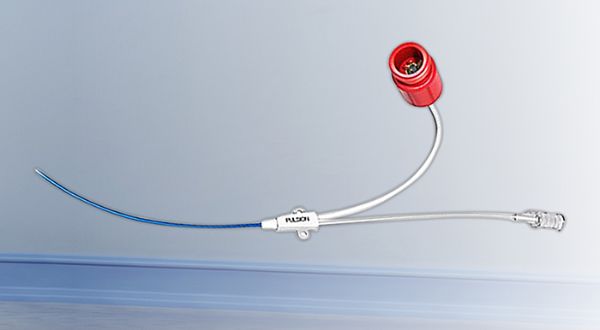Increase production of medical technology via digitization
Digitization is increasingly proving to be a turbo in the fight against pandemics: The outbreak of the Corona virus caused the demand for respiratory equipment to skyrocket. For medical technology companies, this meant producing a large number of parts in large quantities within a very short time. Particularly important components of the lung machines are PiCCO catheters from Getinge, which use state-of-the-art technology to monitor the condition of COVID-19 patients.
Heraeus Medical Components has been supporting the company in the production of the catheters for 17 years - and has almost doubled its production capacity within a very short time by means of digital solutions. When the Corona pandemic broke out globally in 2020, the need for medical equipment skyrocketed. Masks were needed, as were hospital beds and respiratory machines. To keep sick patients as stable as possible, lung machines monitored important bodily functions. For a long time, highly invasive monitoring methods dominated clinical practice. However, less invasive methods such as PiCCO-Technology are increasingly being used. Developed by Pulsion Medical Systems (now Getinge), the technology can predict the amount of fluid in the lungs better than conventional catheters - and thus detect symptoms of COVID-19 more frequently. PiCCO catheters can be flexibly calibrated. They are inserted into the patient via arteries. Sensors measure key blood flow parameters such as velocity and temperature, as well as lung water. The catheter uses the measurement to show how severely the virus has affected the lungs - and how best to treat the patient. In an emergency, the measurement results make the difference between life and death. Bottlenecks in this area are not an option.

Our contribution: Production of medical technology such as PiCCO catheters
Even before the start of the pandemic, the Heraeus Medical Components Business Unit supported the Swedish medical technology company Getinge in the production of PiCCO catheters and sensors.
"The partnership with Heraeus began over 20 years ago," says Jan Führling, Head of Supply Chain at Getinge. "Since 2004, Heraeus has been manufacturing medical products on our behalf as a contract manufacturer. What we value about Heraeus is its reliability, the high-quality standards that are vital in this industry, and the trusting relationship between business partners. It is only through the combination of these factors that we are able to implement changes quickly, respond cooperatively to fluctuations in demand, and bring absolutely reliable products for patient use to the global market," says Führling.
When the demand for ventilators was particularly high in 2020, Heraeus Medical Components also had to ramp up its production as quickly as possible. "The order volumes were so enormous that we had to almost double production in the middle of 2020, from 600 PiCCO catheters to 1000 a day," recalls Sebastian Erbe, Site Manager at Heraeus Medical Components. "As if from one day to the next, we thus had to increase production by 40 percent." This was only possible with efficient methods - and by means of digitization. For example, all the information needed for the production of PiCCO materials was made available on tablets. This not only saved paper, but also important time, because data was now available in real time for purchasing. By switching to digital organizational and administrative processes alone, Sebastian Erbe's team was able to save 500 production hours - and use them elsewhere. Releases and approvals were faster, as were possible changes to the design. More employees were also trained digitally and integrated into the production process. With success: Instead of the usual 120,000 catheters per year, Heraeus Medical Components was able to produce 160,000 last year.
"As a 'supplier of suppliers' and driver of innovations in the medical technology sector, we were aware of our responsibility from the very beginning," Erbe emphasizes. "That's why we did everything we could to increase our production capacities as quickly as possible. Digitization has helped us decisively in this - according to our calculations, it has enabled us to help save around 65,000 additional lives in 2020."
